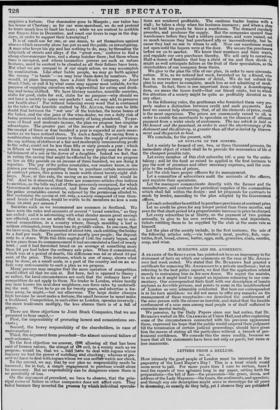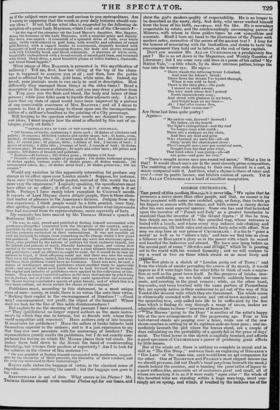LETTERS FROM A RECLUSE.
NO. Iv.
How intensely the good people of London must be interested in the pageantry of the Lord Mayor's Day ! This is a treat which would seem never to pall. For more years than I care to reckon, have I read the reports of two columns long in my paper, setting forth the preparations—the bill of fare—the procession—the grace, dress, and address of the Lady Mayoress—the toasts, the sentiments, and speeches; and though any one description might serve in stereotype for all years to doomsday, so exactly do they tally, yet I observe they are pubhshed as if the subject were .ever new and curious to you metropolitans. Am I wrong in supposing that the words in your daily histories should con- vey ideas ? If not, tell me what idea is suggested by the following de- scription of a quasi Lady Mayoress, which I cut out of the Chronicle I- " At the top of the chamber sat the Lord Mayor's daughter, Mrs. Bagster, doing the honours of the Lady Mayoress, with a singular grace and dignity. Her dress was superb : it consisted of a splendid dress of tulle, over white satin, richly embroidered in gold lama, with wreaths and columns of raised gold flowers, with a superb border to correspond, elegantly finished with bouquets of gold roses and drooping flowers, the body and sleeves trimmed with rich Chantilly bond, and blond seduisants. A manteau of white satin, beautifully embroidered with a broad wreath of raised gold lama, and trimmed with blond. Head-dress, a most beautiful plume of white feathers, diamonds, and broad blond lappets."
What image of Mrs. BAGSTER is presented in this mystification of millinery ? Tell me, first, how her sitting at the top of the cham- ber is supposed to concern you at all ; and then, how the public mind is affected by the tulle, gold lama, white satin, &c. Indeed, my friend, your journals seem to run sadly to seed in description. How differently they managed these things in the olden times ! Read a description in the ancient chronicles, and you may draw a picture from it. They gave you the flesh and blood, the body and bones of their persons ; while your folks seem to handle their adjuncts only. I don't know that my state of mind would have been improved by a picture of any conceivable exactness of Mrs. BAGSTER ; and all I mean to express is, that it is provoking to thrust upon one the incomprehensi- hilities of a milliner's bandbox as the painting of a City personage. Still keeping to the question whether words are designed to repre- sent ideas, I must inquire how the mind is affected by this sort of ca- talogue, yearly set forth ?
"GENERAL BILL OF FARE AT THE BANQUET, GUILDHALL.
"200 tureens of turtle, containing 3 pints each ; 50 dishes of chickens and pullets ; 50 capons ; 30 boiled turkeys and oyster sauce, hot ; 45 hams, orna- mented; 30 tongues, ditto ; 15 stewed rumps of beef, hot ; 30 dishes of shell fish ; 15 raised pies ; 30 pigeon, ditto; 6 dishes of fish ; 2 barons of beef ; 3 pieces of sirloin ; 8 ditto ribs ; 2 rumps of beef ; 3 rounds of beef ; 50 dishes of mince pies ; 30 marrow puddings; 40 apple and other tarts ; 105 jellies and creams ; 120 dishes of brocoli and potatoes. " Remove-40 turkeys ; 105 dishes game ; 50 dishes wild fowl. "Dessert-160 pounds weight of pineapples; 150 dishes hothouse grapes; 50 dishes apples, various sorts ; 60 dishes pears; 40 dishes walnuts; 100 ornamented cakes, &c.; 50 dishes dried fruit ; 50 dishes preserves ; 100 ice creams."
Would any variation in this apparently interesting list produce any change in its effect, upon your London minds? Suppose, for instance, there were 210 tureens of turtle quoted, instead of 200, would the ten more vary the impression ? Logically speaking, the specification must have effect or no effect ; if effect, what is it ? if none, why is it set forth. Perhaps I have rashly taken exception to COOPER'S novels. If reports.. k Lord Mayors' shows delight people, then: is there abun- dant matter of pleasure in the American's fictions. Judging from my own experience, I think people would be a little puzzled, were they, after spelling through a newspaper, to ask themselves what impressions they had received from its representations, more especially of facts. My curiosity has been moved by Mr. THOMAS MOORE'S speech at Stationers' Hall :— " He was he said, proud and gratified at finding himself surrounded with gentlemen altogether connected with the literature of the country, and re- spectable by the character of their pursuits, the liberality of their conduct, and the property embarked in their undertakings. It was not possible on such an occasion to refrain from remarking on the change which a few years had produced. The publishers of the present day were not mercenary specu- lators, who profited by the talents of authors for their exclusive benefit, but the friends and patrons of merit, liberally fostering talent, and risking their capital in its encouragement. There was now a close alliance between authors and publishers—such an alliance as ought to exist, for it would be in vain for authors to beget, if their offspring could not find their way into the world.. They were the mothers, indeed, but the publishers were the nurses, and with- out them their children would have no existence. There was now, he said, a
degree of z among publishers which enabled them to appreciate merit; and men oftalent now knew where to look forward for its reward. The capital and industry of publishers were applied to the cultivation of lite- rature. They no longer regarded authors as the mere instruments by which they rose to fortune, but as friends with whom they could sympathise and associate. Mr. Moore having concluded a speech of great beauty, and of which this is a very faint outline, sat down amidst the cheers of the company."
Publishers must, according to this statement, be a most unique class of men—surely, in trade, there is no virtue like unto their virtue. "Risking their capital in the encouragement of literature ! "—Good men ! encouragement, not profit, the object of the hazard! Where shall we look for the like of this noble disinterestedness ?
13ot explain to me the meaning of that passage I have underscored, —" They (publishers) no longer regard authors as the mere instru- ment s by which they rise to fortune, but as friends with whom they could sympathize and associate." Have authors only of late become fit associates for publishers? Have the sellers of books hitherto held themselves superior to the makers ; and is it a just expression to say that they can now associate with the aristocracy of intellect? The representation greatly exalts the publishers, but I do not exactly com- prehend the footing on which Mr. Moons places their tall stools. He makes them hold down to the literati the hand of condescending friendship, but whence their position of superiority? Am I to look for the solution in the climax of this sentence ?— " He was gratified at finding himself surrounded with gentlemen, respect- able by the character of their pursuits, the liberality of their conduct, and the property embarked in their undertakings."
BACON calls riches the baggage of virtue, in the classical sense of irapedimenta—embmassing the march ; but the baggage now goes in
the van.
ARisroPHANEs is out of date. What errors in his Plutus I Mr. THOMAS MOORE should write another PAIN; apt for our times, and show the god's modern quality of respectability. He is no longer to be described as the nasty, dirty, foul deity, who never washed himself from the hour of his birth, ErxecToqtars, and the like. He is nowadays respectable by estate, and the condescendingly encouraging patron of Minerva, with whom in these golden times he can sympathize and associate. Shall! turn my hand to the illustration of the Plutus with modern notes, corrective of the errors of the ancient text ? I long for the honour of associating with the booksellers, and desire to taste the encouragement they hold out to letters, at the risk of their capitals. Don't you account Mr. ALLAN CUNNINGHAM a prodigiously fine poet ? He is so set down in the Magazines, and Weekly Gazettes of Literature ; but I see some very odd lines in a poem of his called "My Native Vale,"—a title which, by its sheer intrinsic pathos, brings the tear into the tender eye. He says- " There stands the tottering tower I climbed,
And won the falcon's brood; There flows the stream I've trysted through, When it was wild in flood : There is the fairy glen,—the pools I mused in youth among, The very nook where first I poured Forth inconsiderate song ; And stood with gladness in my heart, And bright hope on my brow- Ah ! I had other visions then, Than I have visions now."
Are those last lines quite poetry? Again-
" My native vale, farewell ! farewell !
My father, on thy hearth The light's extinguished—and thy roof No longer rings with mirth ; There sits a stranger on thy chair,
And they are dead and one
Who charmed my early life—all—all Sleep 'math the churchyard-stone : There's nought moves save yon round red moon, Nought lives but that pure river, That lived when I was young—all—all Are gone—and gone for ever."
"There's nought moves save yon round red moon." What a line is that ! It would shock one's ear in the most slovenly prose composition. The rumbling of iron rods dancing to their own discord in a cart, is music compared with it. And then, what a rhyme is there of river and ever f—iver by poetic licence, and kitchen custom of speech. Yet is Mr. ALLAN CUNNINGHAM a bard of excellent acceptation.



















 Previous page
Previous page